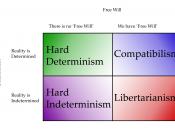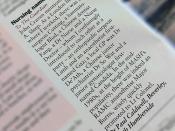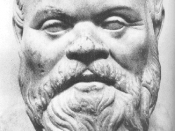We ought then regard the present state of the universe as the effect of its previous state and the
cause of the one which is to follow. An intelligence knowing at a given instant of time all the
forces operating in nature, as well as the position at that instant of all things of which the
universe consists, would be able to comprehend the motions of the largest bodies in the universe
and those of the smallest atoms in a single formula - provided that it was sufficiently powerful to
submit all these data analysis. To it nothing would be uncertain and the future would be present
to its eyes as much as the past.
This passage comes from P.S. de Laplace's "Philosophical Essay on Probabilities." If such
determinism is true, then everyone's every thought and action must be inevitable; that no
one really has any choice about anything, because we are all helpless products of blind
forces which have made us what we are.
In this paper concerning the free will and
determinism debate I will argue that determinism is not plausible, I shall do this by giving
reasons for determining how determinism is false, give arguments for determinism, and
then refute those arguments.
There are those who think that our behavior is a result of free choice, but there are
others who presume "we are servants of cosmic destiny or that behavior is nothing but a
reflex of heredity and environment." The position of determinism is that every event is
the necessary outcome of a cause or set of causes. That everything is a consequence of
external forces, and such forces produce all that happens. Man is not free. If we accept
the determinist argument and assume human behavior as a consequence of external factors
rather than...


